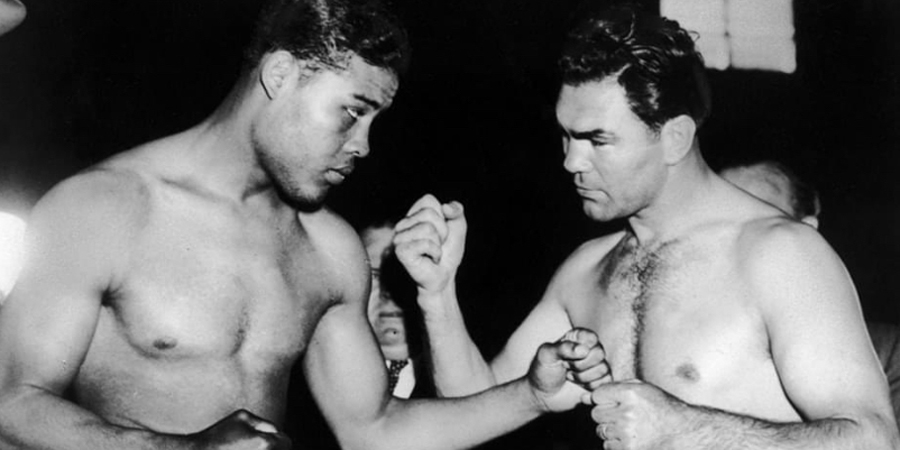Between 1930 and 1932, a German (and Nazi favorite) boxer by the name of Max Schmeling was the heavyweight champion of the world. Between 1937 and 1949, it was Joe Louis — a Black man who rose to boxing fame amidst the Jim Crow era of legalized racism in America.
These two men, shrouded in the political worlds they each carried with them, met in the boxing ring in 1936 and 1938. An underdog heading into the first bout against the undefeated Louis, Schmeling won by knockout in the 12th round. Though Schmeling was never a member of the Nazi party, he instantly became a celebrity in his German homeland, a symbol of Nazi power and superiority. Parades were held in his honor as politicians clamored for a photo with the national hero. The rematch of the century was set two years late in Yankee Stadium, with Louis taking home the victory. Louis’ triumph became part of America’s cultural path to World War II, a stark reputation of the “America First” ideology that considered Louis to be sub-human.
In his autobiography, entitled My Life, Joe Louis noted:
Then there were the Americans with pro-Nazi sympathies, some of who were regular visitors to Louis training camp in Pompton Lakes, N.J … Can you believe these were white Americans agreeing with what Hitler was doing? The Bund had a camp up at Speculator, New York, and they’d come to my camp day after day with Swastikas on their arms. They watched me train and sat around laughing like jackasses.
Louis would go on to defend his title a record 14 more times, before the war intervened. For his part, Schmeling would fight just once more a year later before the war and military conscription cut his career short. Though divided by far more than an ocean, both of them, like corks floating on stormy waters, lived for the love of boxing.

Long after the fighting ended, Schmeling visited Louis in America, unannounced. Schmeling remembered that first visit well,
We sat there together for hours, until late in the evening, talking about the great fights and the old friends. And it was only then that I realized how much it had bothered me over the years that the hatreds of the times had managed to separate us.
All the hype and political theater around them was simply not who they were. Despite his being branded as a propaganda puppet, Schmeling never was a member of the Nazi party. They shared a deep devotion to the truth of the ring: the best boxer wins. None of the huge constructions of their cultures dimmed their bond. Humans are humans, even if humanity wants to correct the love we share when it is deemed to be wrong.
Later, Schmeling stated, “The outcome of the fight wasn’t important … what’s important is that after all these years we’re still friends.” On opposite sides of a boxing ring and a world war, Schmeling and Louis shared an uncommon friendship that overcame both, finding a mutual respect and compassion that exceeded even the darkest of divides.
Amid the anger and fear of life, it is easy to vilify our opponents. To see them as contemptable, beneath our understanding. The hated opponent in the other corner deserves everything he gets. But the friendship of Louis and Schmeling suggests something else may be impossibly-possible, that the outcome of our daily fights is far less significant than love.
The love between Joe Louis and Max Schmeling was a direct connection given to every one of us by God. At the end of Louis’ life, it was Schmeling that helped him make ends meet. And it was Schmeling that paid for his funeral and was one of his pallbearers.
I think that sharing pain in contest and competition is what often brings humans together – the shared passion and devotion to the risk of real danger galvanizes the capacity we have to look beyond ourselves and our successes.
It is God who gives us that ability to love, extending to and from each and every one of us is what matters when the screaming stops. That love is fully revealed to us in Jesus. We are in a hate filled time. Every pain and defeat of one group is hailed and celebrated by the other, where every Joe Louis or Max Schmeling is vilified or idealized. Despite ourselves God will always choose to love and forgive, and we can, too. With each trolling retort or meme of hatred on the internet, there remains a God who saves us from ourselves.
We can know the fundamental truth of the love we share. With Jesus, nothing will separate us from his love nor keep us from giving that love to others, even “the hatred of the times.”

COMMENTS
One response to “Friendship After the Fight”
Leave a Reply













[…] In Mockingbird: Friendship After the Fight […]